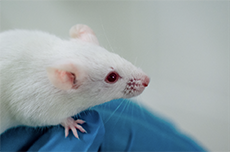Animal Models

Genetic manipulation of the mouse genome is essential for understanding gene function and for discovering the genetic and molecular basis of human disease. Thus, efficient use of genetically modified mouse models can enhance the potential for the development of targeted therapeutics and effective prevention strategies.
Technology Overview
The University of Michigan has developed over 100 mouse models that are valuable for studying the pathophysiology of the human disease and assessing therapeutic options in a genetically defined system.
Mouse models are available within the following disease areas:
- Cancer Research
- Cardiovascular and Thrombosis Research
- Reproductive Research
- Neurobiology Research
- Renal Disorder and Virology Research
- Metabolism, Diabetes, and Obesity Research
- Immunology, Inflammation, and Autoimmunity Research
- Internal/Organ and Bone Research
- Hematological Research and Plasminogen Activation
- Endocrine Research
- Developmental Biology Research
- Cre Recombinase Expression, Research Tool
- Neuromuscular/Muscular Atrophy Research
Further details about specific models can be provided upon request.
Benefits
- Preclinical studies are critical for identifying safe, potent, and efficacious drugs
- Appropriate preclinical models can successfully evaluate drug candidates in aspects of pharmacodynamics, pharmacokinetics, and toxicology in in vivo, therefore, minimize subsequent clinical failure
Applications
- Studying functions of genes
- Genetic screening experiments
- Test drug candidates in vivo
- Target validation
- Modeling genetic disorders
Opportunity
- Available for licensing

